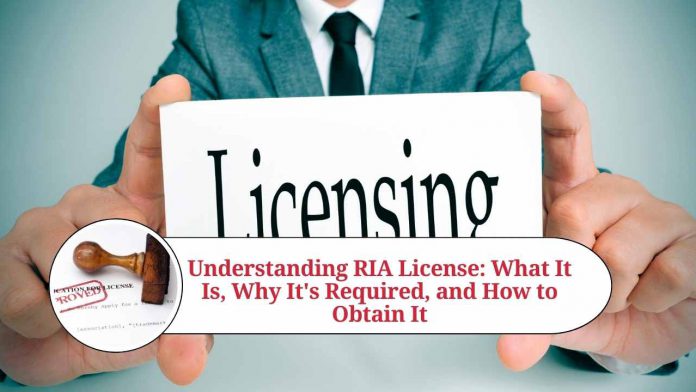What is an RIA License?
A Registered Investment Advisor (RIA) is a financial professional who has obtained a license to offer investment advice and manage portfolios for clients. An RIA License is a regulatory registration required by the Securities and Exchange Commission (SEC) for individuals or firms that provide investment advice for a fee.
Why is an RIA License Required?
An RIA License is required by law to ensure that investment advisors follow a set of guidelines and standards when offering investment advice to clients. The registration process involves a thorough review of the advisor’s business practices, including investment strategies, fees, and disclosure of conflicts of interest. The license helps to protect investors by providing a level of oversight and accountability for investment advisors.
How to Obtain an RIA License?
To obtain an RIA License, an individual or firm must register with the SEC or state securities regulators, depending on the size of their business and the states in which they operate. The registration process involves completing a series of forms and providing detailed information about the advisor’s business practices and investment strategies. The SEC or state securities regulators will review the registration materials and may request additional information before granting the license.
Requirements for an RIA License
To obtain an RIA License, an individual or firm must meet certain requirements, including:
- Passing the Series 65 Exam: The Series 65 Exam is a requirement for most investment advisors and covers topics such as investment strategies, ethics, and regulations.
- Minimum Assets Under Management (AUM): Some states have minimum AUM requirements for RIAs, which vary from state to state.
- Compliance Policies and Procedures: RIAs are required to have written policies and procedures in place to ensure compliance with securities laws and regulations.
- Disclosure of Conflicts of Interest: RIAs must disclose any conflicts of interest that may impact their advice to clients.
Benefits of an RIA License
Obtaining an RIA License provides numerous benefits for investment advisors, including:
- Credibility: An RIA License demonstrates that an investment advisor has met the regulatory requirements to provide investment advice.
- Greater Flexibility: Registered investment advisors have greater flexibility in designing investment strategies and managing client portfolios.
- Fiduciary Duty: RIAs are held to a fiduciary standard, which requires them to act in their clients’ best interests.
- Reduced Regulatory Risk: RIAs who follow the rules and regulations set forth by the SEC and state securities regulators are less likely to face regulatory sanctions or legal action.
Benefits of an RIA License
Obtaining an RIA License can also provide benefits for clients seeking investment advice. These benefits include:
- Increased Transparency: Registered investment advisors are required to disclose their fees, investment strategies, and any conflicts of interest. This transparency can help clients make informed decisions about their investments.
- Customized Investment Strategies: Registered investment advisors have the flexibility to design customized investment strategies that are tailored to each client’s individual needs and goals.
- Holistic Financial Planning: Registered investment advisors often provide more comprehensive financial planning services, including retirement planning, tax planning, and estate planning.
- Ongoing Monitoring: Registered investment advisors typically provide ongoing monitoring and management of client portfolios to ensure they remain aligned with the client’s goals.
- Access to Institutional Investment Opportunities: Registered investment advisors often have access to institutional investment opportunities that are not available to individual investors.
- Fiduciary Duty: As mentioned earlier, RIAs are held to a fiduciary standard, which means they are required to act in their clients’ best interests. This duty helps to ensure that investment advisors prioritize their clients’ needs over their own.
Conclusion
In conclusion, obtaining an RIA License is a necessary step for individuals or firms that provide investment advice for a fee. The regulatory registration provides credibility, flexibility, and reduced regulatory risk for investment advisors, while also offering benefits such as transparency, customized investment strategies, and holistic financial planning for clients. As the investment industry continues to evolve, the importance of an RIA License is likely to increase, and aspiring investment advisors should carefully consider the requirements and process for obtaining the license to ensure they can meet the needs of their clients and remain competitive in the industry.
Read more useful content:
Frequently Asked Questions (FAQs)
What is an RIA License?
An RIA License is a regulatory registration required by the Securities and Exchange Commission (SEC) or state securities regulators for individuals or firms that provide investment advice for a fee.
Why is an RIA License Required?
An RIA License is required by law to ensure that investment advisors follow a set of guidelines and standards when offering investment advice to clients. The license helps to protect investors by providing a level of oversight and accountability for investment advisors.
How do I obtain an RIA License?
To obtain an RIA License, you must register with the SEC or state securities regulators, depending on the size of your business and the states in which you operate. The registration process involves completing a series of forms and providing detailed information about your business practices and investment strategies.
What are the requirements for obtaining an RIA License?
The requirements for obtaining an RIA License may vary by state, but typically include passing the Series 65 Exam, meeting minimum assets under management (AUM) requirements, having compliance policies and procedures in place, and disclosing any conflicts of interest that may impact your advice to clients.
What is the Series 65 Exam?
The Series 65 Exam is a requirement for most investment advisors and covers topics such as investment strategies, ethics, and regulations.
How much does it cost to obtain an RIA License?
The cost of obtaining an RIA License can vary depending on the state in which you operate and the size of your business. Fees may include registration fees, renewal fees, and fees for required exams and continuing education.
What are the benefits of obtaining an RIA License?
The benefits of obtaining an RIA License include greater flexibility in managing client portfolios, a fiduciary duty to act in clients’ best interests, reduced regulatory risk, and increased transparency for clients.
What is the difference between an RIA and a broker-dealer?
An RIA provides investment advice for a fee, while a broker-dealer buys and sells securities for clients. RIAs are held to a fiduciary duty, while broker-dealers are held to a suitability standard.
Can an RIA also be a broker-dealer?
Yes, an RIA can also be a broker-dealer, but they must register separately with the SEC or state securities regulators.
How often do I need to renew my RIA License?
RIAs must renew their license annually and may be required to complete continuing education requirements to maintain their license.




















